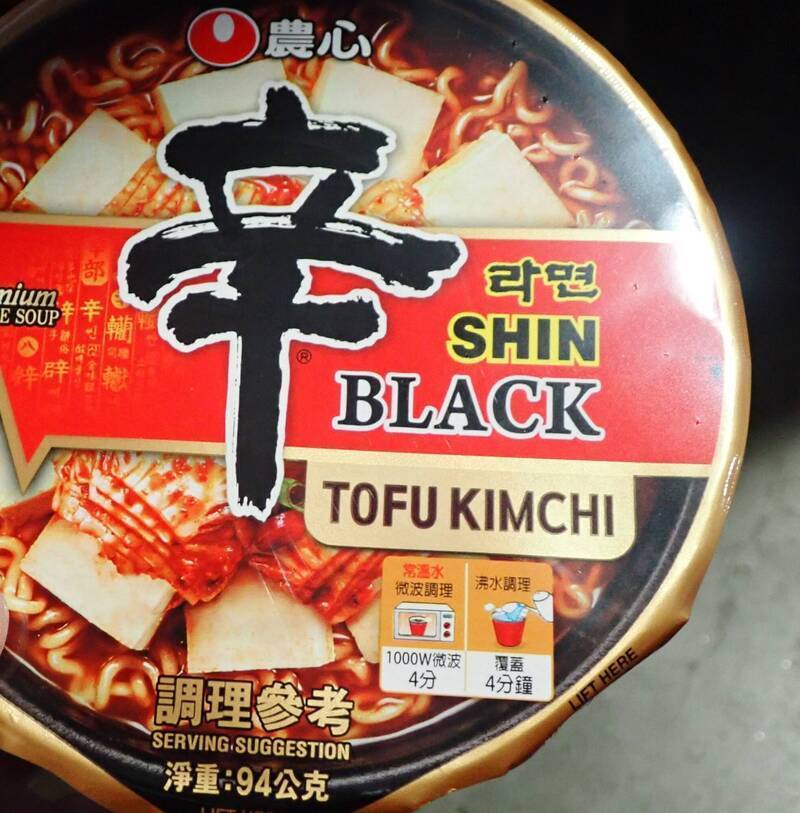A batch of 1,128 kg of "NONGSHIM Nongshim Super Evolution Xin Bowl Noodles (Tofu and Kimchi Flavor)" exported from South Korea was found to contain pesticide residues of ethylene oxide in the seasoning powder package, which violated my country's regulations and must be returned or destroyed.
(Provided by the Food and Drug Administration)
[Health Channel/Comprehensive Report] The Food and Drug Administration announced today (17th) the list of unqualified border food inspections. The "NONGSHIM Nongshim Super Evolution Xin Bowl Noodles (Tofu Kimchi Flavor)" exported from South Korea was detected to have residual pesticide ethylene oxide The content does not meet the regulations.
According to the Environmental Protection Agency, ethylene oxide is a carcinogen. Long-term exposure may affect kidney function, cause allergic reactions in the respiratory tract, and even increase the risk of cataracts, lymph glands, and hematopoietic cancers.
According to the Food and Drug Administration's announcement of unqualified border inspection food, South Korea exported 1,128 kg of "NONGSHIM Nongshim Super Evolution Xin Bowl Noodles (Tofu and Kimchi Flavor) due to the residual pesticide ethylene oxide 0.075mg/kg detected in the seasoning powder package of the product. It does not comply with the provisions of Article 15 of the Food Safety and Sanitation Management Law of my country on the "Pesticide Residue Allowance Standard", so all of them are returned or destroyed according to the regulations.
Please read on...
According to the Environmental Protection Agency, ethylene oxide is a colorless gas at room temperature (below 10°C), with an ether-like odor; highly volatile, flammable and explosive (boiling point 10.7°C); and a carcinogen.
Ethylene oxide is mainly used in chemical raw materials (such as detergent starter), industry (such as industrial disinfectants, fumigants (food and textiles)), medical supplies (such as bandages, sutures and surgical instruments, etc.) utensils).
As for the health hazards of ethylene oxide?
Short-term exposure to high doses can cause anosmia, irritation of mucous membranes leading to emphysema, bronchitis and severe coughing, as well as bradycardia, aphonia, kidney damage, pulmonary edema and, in severe cases, death, the EPA said.
In addition, studies have found that regular overexposure to ethylene oxide can alter blood cells, increase chromosomal aberrations, and spontaneous miscarriages.
The Environmental Protection Agency further stated that long-term exposure may affect kidney function, increase urine protein; and damage the nervous system. Symptoms include numbness in hands and feet, muscle weakness in end joints, and hand-eye coordination; it may also cause dry, red, and itchy skin (dermatitis) and burns, causing respiratory allergic reactions; even increasing the risk of cataracts, causing lymph glands and hematopoietic cancer.
The Environmental Protection Agency reminds that if you want to prevent the damage of ethylene oxide, it is recommended that you take off the contaminated clothes as soon as possible after work, wash them before wearing or discarding them, and wash your hands thoroughly to keep the workplace clean; and The working environment requires regular health checks (lung and kidney, etc.), wearing effective gas masks or face shields, etc.
☆Health news will never be missed, click like to follow the fan page.
☆For more important medical news, please go to Liberty Health.com.
keywords
carcinogen
food safety
Pesticide Residues
Shin Ramen
Ethylene oxide
related news
